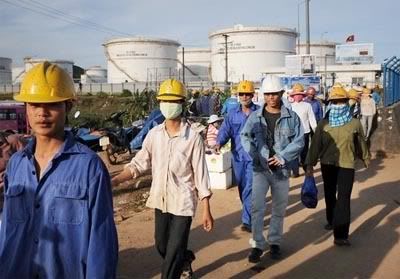[UBBV baovelaodong.com 28/02/2009]
Trên chương trình Connect Asia của đài Radio Australia ngày 23/2, UBBV
lên tiếng bày tỏ quan ngại về tiền lương và điều kiện làm việc tại nhà
máy lọc dầu của nhà cầm quyền CSVN vừa khánh thành tại Dung Quất.
"Luật lao động cấm người lao động tại nhiều kỹ nghệ đình công, kể
cả kỹ nghệ dầu hoả. Và cũng như tất cả người lao động tại Việt Nam,
công nhân tại Dung Quất bị tước mất quyền có nghiệp đoàn của riêng họ.
Không có quyền đình công, không có nghiệp đoàn, thì lương bổng ra sao
sẽ hoàn toàn tùy thuộc vào lòng tốt của chủ. Điều này, theo chúng tôi,
rất đáng quan ngại" - ông Đoàn Việt Trung, Thư Ký của UBBV (Ủy
Ban Bảo Vệ Người Lao Động Việt Nam), phát biểu như trên với phóng viên
Sonja Heydeman.
Tiếp theo, ông Trung nói rằng nhà cầm quyền tuyên bố sẽ tạo ra 20 ngàn
việc làm, nhưng họ nói thì nói, cần phải chờ coi thực sự sẽ có bao
nhiêu.
Cùng phát biểu trong bài phóng sự này, ông Adam McCarty, kinh tế gia
của Mekong Economics tại Hà Nội, nói rằng nếu Hà Nội muốn tạo ra 20
ngàn việc làm thì bỏ ra 5 tỉ Mỹ Kim là quá nhiều. Ngoài ra, theo ông
McCarty thì vì nhà máy lọc dầu này ở xa mỏ dầu hoả ở miền Nam, nên việc
chở dầu thô lên Dung Quất sẽ rất tốn kém. Còn ông Adam Forde thuộc Asia
Institute của Đại Học Melbourne thì phát biểu rằng việc mở nhà máy lọc
dầu là một bước tiến trong tiến trình phát triển kinh tế Việt Nam.
Bản tin tiếng Anh của phóng viên Sonja Heydeman và phần phát thanh, có trên trang mạng baovelaodong.com của UBBV.
Vietnam's first oil refinery goes into production
AUDIO from Connect Asia
Sonja Heydeman reports on the opening of Vietnam's first oil refinery
Created: Mon, 23 Feb 2009 11:11:55 GMT+1100
Sonja Heydeman, Connect Asia
Last Updated: Mon, 23 Feb 2009 14:18:00 +1100
Vietnam's first oil refinery starts production this week following a nationally celebrated opening on Sunday.
The
opening of the the Dung Quat refinery in central Vietnam follows a
decade of delay, and has been feted as a key moment in Vietnam's
development.
State-owned PetroVietnam Group is financing and running the new
facility, which is expected to produce 6.5 million ton of refined oil
each year, supplying 30 percent of domestic requirements.
Up to now, although Vietnam has considerable offshore oil reserves,
it has had to import all petroleum products, at a cost of hundreds of
millions of dollars annually.
Adam McCarty, chief economist
at Mekong Economics in Hanoi, told Radio Australia's Connect Asia
program that the siting of the refinery may cut into some of the
savings it is expected to generate in terms of reduced reliance on
imports.
"The choice of the location wasn't the optimum
location for an oil refinery in Vietnam, because they pump up the oil
in the south, and they'll have to transport it to the centre of the
country for refining," Dr McCarty said.
He says the project has ended up being fully owned and run by
Vietnam, after attempts to set it up as a joint venture with Malaysia,
and later with Russia, both fell through.
Doctor Adam Forde, from the Asia Institute at Melbourne University in Australia says the opening of
He says the opening of Dung Quat signals a fresh stage in Vietnam's economic evolution.
"Vietnam's
original integration into the world economy was as an exporter of
unprocessed products - rice, that was coming out of the Mekong Delta
during French colonial rule, and increasingly shifting to add value,
and they've been relatively successful at that," he said.
"And part of that is refining their own oil, as part of the development process."
Vietnamese authorities hope the refinery and the industrial zone
built around it will create jobs for more than 20,000 people in the
area.
Dr McCarty says that as an exercise in job creation, it has been
disproportionately costly, but worthwhile in boosting incomes in an
extremely poor part of Vietnam.
"This is a $5 billion
investment, and you can create 20,000 jobs a lot more cheaply if you
want to, if you focus on creating the jobs," he said.
"But
it's a very poor area, so they've put in roads and ports, they've got
an industrial zone next to it, which will create a lot of jobs just
feeding people, setting up shops, working in factories. Certainly it
will be a huge boost to the economy of a very poor province."
Dung
Quat refinery has attracted significant international attention,
including overseas union representatives who have concerns for local
workers in Vietnam.
"Labour law in Vietnams do not allow
workers in industry, such as the oil refinery industry, are not allowed
to strike, and every other worker in Vietnam is not allowed to organise
themselves into union," said Trung Doan, secretary of the Committee to Protect Vietnamese Workers, which is based in Australia.
"That would mean that what conditions they would get would be up to the whim of the employers, and that's very worrying."
PetroVietnam says it is designing another refinery in the north,
and has tentative plans for a third, as Vietnam strives towards energy
autonomy.
However those projects may take several years to get off the
ground, until the global economic outlook begins to improve and the
necessary credit becomes available. |

